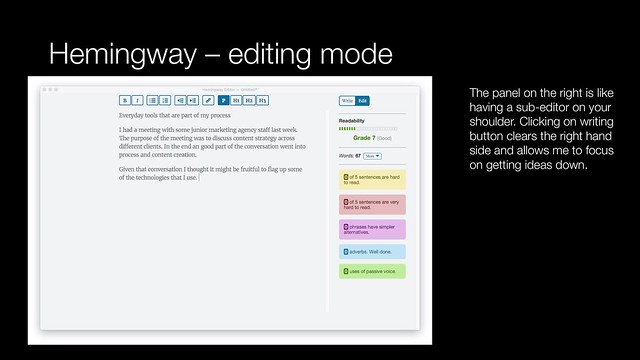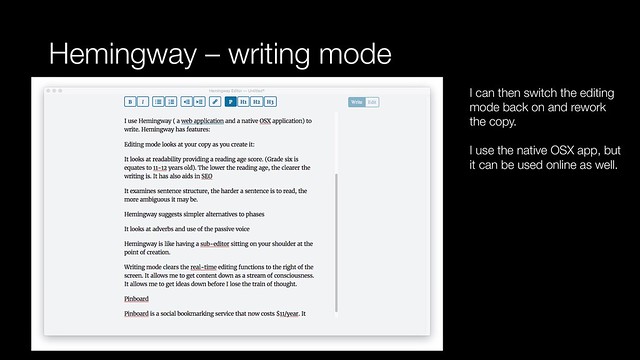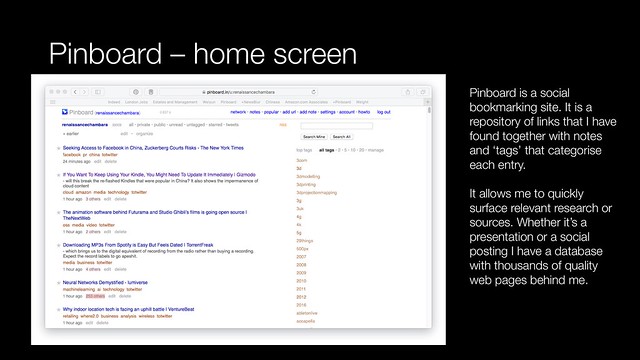I use a range of tools including Hemingway as part of my content creation process. This came out when I had a meeting with some junior marketing agency staff last week. The purpose of the meeting was to discuss content strategy across different clients. In the end an good part of the conversation went into process and content creation.
Given that conversation I thought it might be fruitful to flag up some of the technologies that I use.
Hemingway
I use Hemingway ( a web application and a native OSX application) to write. Hemingway has two writing modes:

Editing mode looks at your copy as you create it:
- It looks at readability providing a reading age score. (Grade six is equates to 11-12 years old). The lower the reading age, the clearer the writing is. It has also aids in SEO
- It examines sentence structure, the harder a sentence is to read, the more ambiguous it may be.
- Hemingway suggests simpler alternatives to phases
- It looks at adverbs and use of the passive voice
Hemingway is like having a sub-editor sitting on your shoulder at the point of creation.

Writing mode clears the real-time editing functions to the right of the screen. It allows me to get content down as a stream of consciousness. It allows me to get ideas down before I lose the train of thought.
You can then switch to editing mode to go back and clean up your copy once you have it down.
The OSX version allows you to save documents down as a HTML file, from which you can cut and paste into a destination. It just works whether its a presentation, document, WordPress or social platforms.
Pinboard
Pinboard is a social bookmarking service that now costs $11/year. It allows me to store links and notes about websites that I find of interest.

Pinboard is a web service so my bookmarks go where I can get a web connection.

I use a bookmarklet that sits in the chrome of my browser. Every time I come across something that might be of interest, I click on the link and complete a simple form.
- URL – I only change the link if it is a temporary link such as ‘feedproxy.google.com’. I expand the link or change it to any permalink that is on the page
- Title – I edit this as necessary to reflect the article title and the website name
- Description – this is a quick explanation of why I thought the page was significant. It might be an article quote or top statistics mentioned
- Tags – categories or labels that I assign to an article which allows me to find it based on a relevance. Tags are used by other applications as well
I use Pinner for iOS on my iPhone. It integrates into the system level sharing functionality. I can create bookmarks on the move as well as at my desk.
Terminal
The Terminal app in OSX allows direct access to the power of the operating system. It is also unforgiving. Getting a command wrong can have serious consequences.

There are a few things that I can do faster in terminal than via other methods. From checking differences in documents, to batch processing file archiving. To get you started here are two examples that you can try: to see if a website is up to getting a weather forecast.


I have a copy of UNIX in a Nutshell from O’Reilly Media on my bookshelf. I use this as a back-up when I can’t remember the proper syntax or a command. I can also recommend Learning Unix for OS X: Going Deep With the Terminal and Shell also from O’Reilly Media.
IFTTT
At the beginning of 2007 Yahoo! launched an experimental product called Yahoo! Pipes. It was flakey, it was unreliable but also revolutionary. Pipes was an easy way to stitch together services without programming expertise. After years of flakey service it was shutdown by Yahoo! in June 2015.

Pipes inspired another service IFTTT. IFTTT stands for ‘If then, then that’. It is a simple cause and effect framework that allows for the automation of actions over the web. These cause and effect formulas called recipes. It supports a range of web services and apps. Most of the discussion around this for Intenet of Things automation. I use it to automate my web content content.
More in part two.
I pulled part one together in a companion presentation.
More information
Hemingway OSX application
Pinner app for iOS
IFTTT – (If Then, Then That)
Books
Learning Unix for OS X: Going Deep With the Terminal and Shell by Dave Taylor
UNIX in a Nutshell by Arnold Robbins